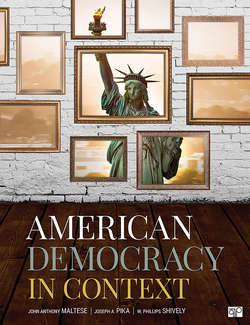Читать книгу American Democracy in Context - Joseph A. Pika - Страница 154
На сайте Литреса книга снята с продажи.
Due Process Rights of the Accused
ОглавлениеWe spoke earlier in this chapter about the concept of procedural due process: the idea that the government must follow fair proceedings before taking away a person’s life, liberty, or property. The due process clause of the Fifth Amendment limits the actions of the federal government (“No person shall be … deprived of life, liberty, or property, without due process of law”). The Fourteenth Amendment added another due process clause that specifically limits state action (“[No] State shall … deprive any person of life, liberty, or property, without due process of law”).
The Bill of Rights contains other specific guarantees that deal with the rights of criminal defendants. For example, the Fourth Amendment protects against “unreasonable searches and seizures.” The Fifth Amendment requires grand jury indictment in capital or otherwise infamous crimes and protects against double jeopardy (being tried twice in the same court for the same crime) and self-incrimination. The Sixth Amendment guarantees the right to a speedy and public trial by an impartial jury in which the accused has the opportunity to confront witnesses against him or her and has the right to a lawyer. The Eighth Amendment protects against “cruel and unusual punishment” as well as “excessive bail” and “excessive fines.”
Can the Fourteenth Amendment’s guarantee of due process be met without incorporating these specific guarantees? Until the middle of the twentieth century, the Supreme Court often said yes. Most of the provisions of the Bill of Rights dealing with criminal defendants have only recently been incorporated, the majority of them in the 1960s and the prohibition of excessive fines as recently as 2019. Even today, some provisions—such as the Fifth Amendment right to grand jury indictment and the Eighth Amendment right against excessive bail—have not been incorporated. (See Table 4.2 on page 81.)
Before incorporation, states merely had to apply due process, and the Supreme Court often upheld convictions in cases where states did not follow other specific guarantees in the Bill of Rights—for example, convictions in cases where defendants were tried twice for the same crime or denied the right against self-incrimination.112 As long as the overall criminal process seemed to be fair, a procedural error based on one of the specific guarantees of the Bill of Rights typically was not deemed serious enough to overturn a state court conviction.
Even after incorporation, the Supreme Court continues to recognize that there may be more than one way for states to prosecute accused criminals while still protecting their rights. Only those specific guarantees of the Bill of Rights that the Court has deemed “fundamental” have been incorporated. This has been done through the process of selective incorporation discussed earlier in this chapter. But some of the incorporated provisions are ambiguous, allowing the Court to give states some flexibility in the way they apply even some of the incorporated provisions.
writ of habeas corpus A judicial order requiring that a prisoner be brought before a judge to determine whether there is a lawful justification for incarceration.
A good example is the Sixth Amendment right to trial by jury in criminal cases. The Supreme Court incorporated that right in 1968.113 But what exactly does a right to trial by jury mean? The Sixth Amendment says nothing about the specific size of the jury or whether the verdict must be unanimous. Nonetheless, all federal juries consist of 12 people and federal criminal cases require a unanimous verdict to convict. Does incorporation of the Sixth Amendment bind the states to juries of 12 people and unanimous jury verdicts? The Supreme Court has said no.114 Nonetheless, the Court has held that juries that are too small (which it defines as any made up of fewer than six people) violate due process.115 Likewise, it held that verdicts that are not unanimous may violate due process if the jury is too small: It ruled that even though 11–1 and 10–2 verdicts are constitutional, a 5–1 verdict violates due process.116
